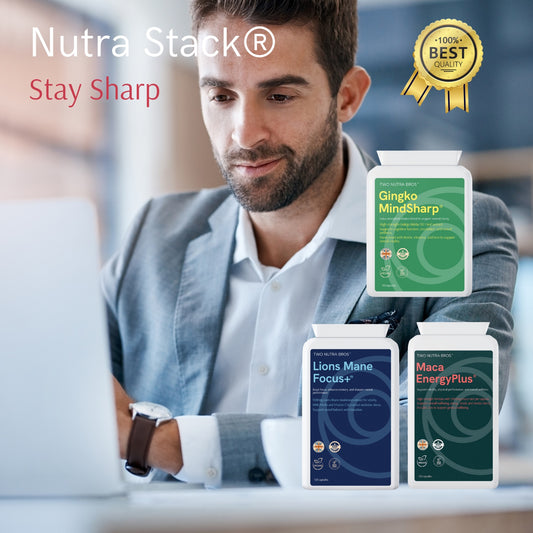
The Benefits of Natural Herbal Heart Health Supplements To Improve Men's Heart Health
Share
Heart health is a cornerstone of overall well-being, and with heart disease being a leading cause of death worldwide, many are seeking preventive measures beyond pharmaceuticals. Incorporating natural herbal supplements as part of a holistic health regime can offer a complementary approach to maintaining cardiovascular health.
This article explores the science-backed benefits of key herbal supplements that support heart function and overall cardiovascular health.
1. Hawthorn Berry (Crataegus spp.)
Hawthorn has been used for centuries in traditional medicine for heart health. Modern science supports its efficacy in improving cardiovascular function, particularly in people with early-stage heart failure. Hawthorn contains antioxidants such as flavonoids and oligomeric proanthocyanidins, which help reduce inflammation and protect against oxidative stress, two major contributors to heart disease.
Scientific Evidence:
A meta-analysis of clinical trials demonstrated that hawthorn can improve exercise capacity and reduce symptoms like fatigue and palpitations in individuals with chronic heart failure. It also supports the dilation of blood vessels, improving blood flow and reducing blood pressure.
2. Garlic (Allium sativum)
Garlic is widely known for its heart health benefits. Its active compound, allicin, has been shown to lower cholesterol levels and improve blood pressure regulation. Garlic also exhibits anti-thrombotic properties, which reduce the risk of blood clots, a common cause of heart attacks and strokes.
Scientific Evidence:
Multiple studies have confirmed that garlic supplements can reduce total and LDL ("bad") cholesterol by 10-15% and moderately lower blood pressure in hypertensive patients . In addition, garlic's ability to reduce platelet aggregation decreases the likelihood of clot formation, offering cardio-protective effects.
3. Turmeric (Curcuma longa)
Turmeric contains curcumin, a powerful anti-inflammatory and antioxidant compound. Chronic inflammation is increasingly recognised as a key player in heart disease, contributing to the development of atherosclerosis (plaque buildup in arteries). By reducing inflammation, curcumin supports arterial health and prevents the narrowing of blood vessels.
Scientific Evidence:
Studies show that curcumin supplementation can improve endothelial function, which is essential for maintaining the flexibility and health of blood vessels. It also reduces oxidative stress, a driver of heart disease.
4. Cayenne Pepper (Capsicum annuum)
Cayenne pepper contains capsaicin, a compound that has been found to improve circulation and support vascular health. Capsaicin can help lower blood pressure by promoting vasodilation, allowing blood to flow more freely. It also has cholesterol-lowering effects and supports metabolic health, both of which are important for maintaining a healthy heart.
Scientific Evidence:
Capsaicin has been shown to reduce LDL cholesterol levels and improve blood lipid profiles, reducing the risk of atherosclerosis. It also promotes fat oxidation, supporting weight management, another crucial factor in preventing cardiovascular diseases.
5. Ginkgo Biloba
Ginkgo biloba is widely recognised for its benefits to cognitive health, but it also has positive effects on cardiovascular function. Ginkgo's ability to improve circulation by dilating blood vessels is well documented, making it beneficial for individuals with peripheral vascular disease or other circulatory problems.
Scientific Evidence:
Research shows that ginkgo biloba helps improve microcirculation and reduces oxidative damage, supporting heart health ensuring efficient blood flow throughout the body.
6. Coenzyme Q10 (CoQ10)
Although not technically an herb, CoQ10 is a naturally occurring antioxidant in the body that supports cellular energy production. Levels of CoQ10 naturally decline with age, and supplementation has been shown to benefit individuals with heart conditions by improving mitochondrial function and reducing oxidative damage.
Scientific Evidence:
In patients with congestive heart failure, CoQ10 supplementation has been shown to improve heart function and reduce the incidence of hospitalisations . It also helps to lower blood pressure and improve overall heart health in hypertensive patients.
7. Ginger (Zingiber officinale)
Ginger is another potent anti-inflammatory and antioxidant herb with cardiovascular benefits. It is known for its ability to lower cholesterol levels, reduce blood pressure, and prevent blood clot formation. Additionally, ginger supports overall circulation and helps maintain healthy blood sugar levels.
Scientific Evidence:
A study published in the International Journal of Cardiology found that ginger can significantly lower blood pressure and improve lipid profiles . Its anti-inflammatory properties further support heart health by preventing damage to blood vessels.
Holistic Heart Health: More Than Just Supplements
While these natural herbal supplements offer significant cardiovascular benefits, they work best when incorporated into a broader holistic health regime. A balanced diet rich in whole foods, regular physical activity, stress management, and adequate sleep all play crucial roles in supporting heart health.
Key Components of a Holistic Heart Health Plan:
- Nutrition: Focus on a Mediterranean-style diet, which emphasises fruits, vegetables, whole grains, lean proteins, and healthy fats (like olive oil and nuts). This diet has been proven to reduce the risk of heart disease.
- Exercise: Regular aerobic exercise, such as walking, swimming, or cycling, strengthens the heart muscle and improves circulation.
- Stress Management: Practices like yoga, meditation, and deep-breathing exercises help lower blood pressure and reduce stress hormones that can contribute to heart disease.
- Adequate Sleep: Poor sleep has been linked to an increased risk of heart disease. Aim for 7-9 hours of quality sleep each night to give your heart the rest it needs.
Conclusion
Incorporating natural herbal supplements like hawthorn, garlic, turmeric, cayenne pepper, and CoQ10 into a holistic lifestyle plan can provide protective benefits for your heart. By addressing key aspects such as inflammation, cholesterol levels, and blood pressure, these supplements work in synergy with healthy lifestyle habits to promote optimal cardiovascular function. However, always consult with a healthcare professional before starting any supplement regimen, especially if you have an existing medical condition or are taking medication.
Embrace a holistic approach to heart health by combining the power of nature with mindful living, and give your heart the care it deserves.



